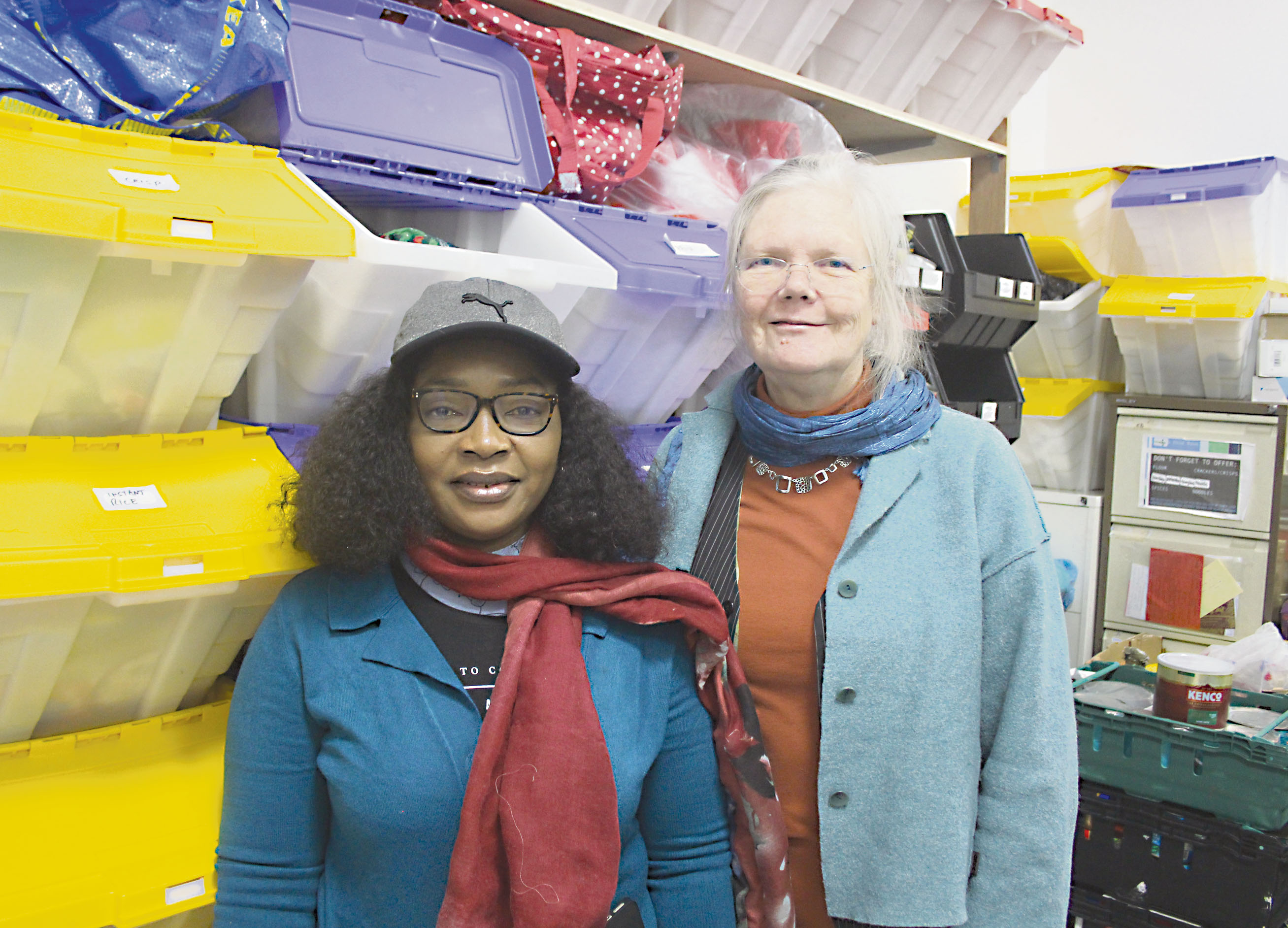Austerity and Big Oil driving food need
FORUM: Thousands are now relying on charity for food – Dorothea Hackman of the Euston Foodbank explains how it has come to this
Thursday, 20th July 2023 — By Dorothea Hackman

Dorothea Hackman, right, with Euston Foodbank co-ordinator Deseline Djiayep
AS austerity bit deeper during the past decade we understood how government policies drove more people to destitution and food banks.
We also understood that there was no longer a welfare state safety-net to catch them, and it was down to charities as the so-called big society, to pick up where the government had abnegated responsibility.
How had it come to be so bad in Euston, that the 3,000 people we saw in 2016 became a rolling hundred households every week by 2019?
It was benefits pegged at 2008 levels while food prices rose, and the implementation of universal credit starting with a minimum of five weeks with no benefit at all putting people straight into debt.
Child benefit was restricted to the first two children, and free school meals then were only available to one family at an address, leaving cousins in need in our overcrowded housing.
Every school holiday was still a crisis with families unable to feed their children, so charities fill the breach with holiday clubs and schools continuing the breakfast clubs, though the very children who most needed food often found it hard to get to school early.
Then we had the pandemic and lockdown meant demand at the food bank literally trebled over night. There were heroic efforts from every quarter to feed the nation, the New Journal included.
Now the upsurge in demand due not only to continued austerity, but spiralling energy costs is leaving families unable to put food on the table for their children, and elderly people having to choose between heating and eating.
Now the steady rise turns into an avalanche again and the summer school holidays loom. Life has become grimmer for millions in this nation.
Euston Foodbank was fortunate to be able to move into the former St Aloysius Infants School building and storing and distributing food from larger premises has been much easier, not only for our volunteers, but also for our clients, who are able to wait in the front quadrangle instead of on the road and pavements of Lancing Street.
As it turned out we had a school kitchen and spare classroom, just when Food for All UK needed to vacate their Holborn premises. So they joined us on Phoenix Road, preparing meals there which are then distributed from their rickshaws, often 5,000 meals a day. It is congenial to share with a like-minded charity.
What we need now to prepare for is climate refugees seeking refuge further north. It is not just in this country that humans are poisoning their water supplies, though we may be unique in knowingly killing our river with sewage, agricultural chemicals and industrial waste.
We ruin our beaches and allow construction like High Speed 2 to contaminate our chalk aquifers. It is our children and future generations who will face this water shortage combined with increasing numbers of people.
Famine in the rest of the world is driven by burning fossil fuels. Big Oil have known and concealed this for decades, and despite promises for instance at COP25 in Paris, governments cannot bring themselves to forgo short term profit and take the necessary steps to at least halt the rising temperatures. Not just wildfires result, but also drought and crop failure, and war follows surely on famine.
We call the people who try to reach our shores in boats economic migrants, but we need to face up to the fact that they are climate refugees and there will be many more needing our help.
So turning to this summer in London, in Camden, what can we expect? A quadrupling of need, which the food banks can only meet with generous donations not only from individuals and schools, and organisations like Flix, City Harvest and Foodbank Aid, but also hefty thousands from the businesses that are still in profit.
We must rely on the kindness of strangers and our wonderful volunteers. To take the example of Euston Foodbank, 40,061 emergency parcels were distributed in the year up to April 2023 including 15,389 for children.
Euston Foodbank is still providing the majority of Emergency Parcels in Camden reported to the Trussell Trust Annual Statistics. There are many other emergency food initiatives nationally, regionally and locally. Numbers have nearly doubled.
There has been a 63 per cent increase in people seeking support from Euston Foodbank in 2022/2023, but shockingly there has been a 91 per cent increase in the number of children supported whereas the number of adults increased by 49 per cent.
This is clearly a result of the increasing energy and cost of living crisis for low income
families, on top of over a decade of austerity measures and sadly can only worsen. People with no fixed address continue to form a significant proportion of our clients.
Although “stock in” (donations and food purchased with money donated) increased to 221,437kg in 2022, “stock out” did not nearly double like demand, at 244,552kg. Consequently the average weight of a food parcel decreased.
• Dorothea Hackman is chair of trustees at Euston Foodbank